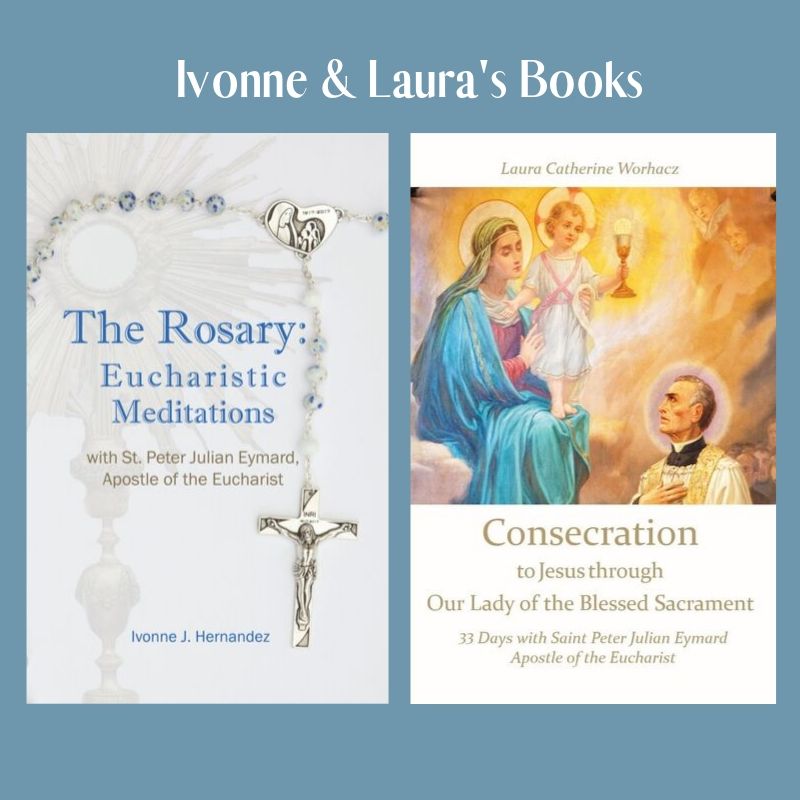ELISHEBA BLOGLaura, Ivonne, and Rick
write about their lives in the Eucharist. |
|
By Ivonne Hernandez “I plead with you! Never, ever give up on hope, never doubt, never tire, and never become discouraged. Be not afraid.” – St John Paul II Meditation: Fear. We all experience it, and each time we do, we need to decide what to do about it. Will we run or will we press on? There are times when fear keeps us safe from real danger, but many times, fear can keep us from doing God’s will in our lives. The martyrs, who endured death through an act of fortitude, teach us that God’s love is greater than all our fears. Most of us won’t be called to die for our faith, but we will all face obstacles on our road to holiness, and we will need to grow in fortitude to face them. When I think of fear I think of Peter, walking towards Jesus on the water. He takes his eyes off Jesus, looks at how strong the wind is, gets frightened, and starts to sink. Just like Peter, I often take my eyes off Jesus and look at the storm threatening me. I find myself saying “Jesus, are you sure you got this?”, and I get afraid. And, just like Peter, as I begin to sink, I cry out, Lord, save me! “Immediately Jesus stretched out his hand and caught him, and said to him, “O you of little faith, why did you doubt?”’(Mat 14:31) We are reminded over and over again in the Bible to not be afraid. If we look again at the passage in Matthew 14, the disciples see Jesus walking on water and become terrified thinking it is a ghost. ‘At once [Jesus] spoke to them, “Take courage, it is I; do not be afraid.”’ (Mat 14:27) Jesus is telling them to DO something, to TAKE courage. This means that courage is there, available for them, but it requires an action on their part, a decision of the will. But where is this courage coming from? If we read a few verses before in Matthew, we find that right before they got on the boat, the disciples had just experienced the miracle of the “feeding of the five thousand”. They all ate and were satisfied, and they picked up the fragments left over—twelve wicker baskets full. Those who ate were about five thousand men, not counting women and children. Then he made the disciples get into the boat and precede him to the other side, while he dismissed the crowds. (Mat 14:20-22) This miracle is a prefiguration of the Eucharist. Jesus feeds a crowd of five thousand with only five loaves and two fish, and there are twelve wicker baskets full of leftovers. Jesus knew the disciples had everything they needed, so He made them get into the boat and precede him. He knew the storms they would face, but He had provided the courage they needed. They still needed to take it, and so do we. Jesus makes every gift available to us in the Eucharist, and then He sends us on our mission. “The virtue of fortitude enables one to conquer fear, even fear of death, and to face trials and persecutions.” (CCC, 1808) We need courage (fortitude) each and every day as we face the challenges set before us, and we find it in our daily Bread, our Bread from Heaven. The word courage comes from the Latin ‘cor’, which means heart. We often hear the expression “take heart”. Yes, let us take His heart, present and alive in the Eucharist. He has all the courage we need there. Let us receive Him often and remain united to Him in our hearts. We will then confidently walk towards Him, wherever He may call us, even walking on water in the midst of a great storm. And, when we look away and begin to sink, let us quickly remember that He is always with us and call to Him for help. He will immediately stretch out His hand and catch us, and with a loving glance remind us: “O you of little faith, why did you doubt?”’(Mat 14:31)
0 Comments
Your comment will be posted after it is approved.
Leave a Reply. |
Categories
All
FOLLOW US ON SOCIAL MEDIA:
AuthorsWe are Ivonne J. Hernandez, Rick Hernandez and Laura Worhacz, Lay Associates of the Congregation of the Blessed Sacrament, and brothers and sisters in Christ. |
Copyright © 2024 Elisheba House Inc.
Elisheba House is a 501(c)(3) non-profit organization. Federal Tax ID Number 84-1894146
Florida registration for Solicitations of Contributions #CH71652
A COPY OF THE OFFICIAL REGISTRATION AND FINANCIAL INFORMATION MAY BE OBTAINED FROM THE DIVISION OF CONSUMER SERVICES BY CALLING TOLL-FREE (800-435-7352) WITHIN THE STATE. REGISTRATION DOES NOT IMPLY ENDORSEMENT, APPROVAL, OR RECOMMENDATION BY THE STATE.
Florida registration for Solicitations of Contributions #CH71652
A COPY OF THE OFFICIAL REGISTRATION AND FINANCIAL INFORMATION MAY BE OBTAINED FROM THE DIVISION OF CONSUMER SERVICES BY CALLING TOLL-FREE (800-435-7352) WITHIN THE STATE. REGISTRATION DOES NOT IMPLY ENDORSEMENT, APPROVAL, OR RECOMMENDATION BY THE STATE.



 RSS Feed
RSS Feed